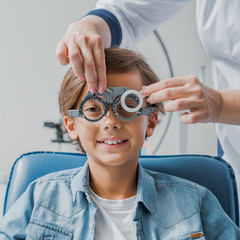What is pediatric eye care? Pediatric eye care is the part of optometry which covers all facets of vision and eye health for children and young adults, ranging from basic eye exams, eye surgeries, vision screening, and treatment for various eye ailments and acute eye injuries. A pediatric optometrist is a professional who specializes in the field of vision care. He or she has specialized training and is equipped with many skills pertaining to vision. Optometrists are also called upon to make decisions on the scope and type of eyewear for babies, children, adolescents and adults. They also act as eye doctors or consultants, in cases of need.
In order to achieve eye health, one must undergo comprehensive eye exams. These exams will include such tasks as screening for eye disorders, examining nearsightedness and farsightedness, determining the presence of infections and other problems in the eyes, testing for glaucoma and macular degeneration, testing for eye hypertension, prescribing corrective lenses, and ordering glasses if necessary. All pediatric eye care professionals are required to have completed an accredited pediatric optometry program. In addition to completing the program, these professionals must meet certain education and training requirements that are set by their states’ governing agencies.
One of the most important tasks of a pediatric eye care provider is to conduct vision tests on patients. Vision tests can help in diagnosing various vision conditions that may have varying degrees in severity. For example, a child may appear to have astigmatism, when in fact he or she has Asperger’s syndrome. Through pediatric eye care specialists, the medical professional can then recommend the best form of treatment for a particular patient.

Another task performed by a pediatric eye care provider in United State is testing a patient’s visual abilities. This includes tests such as special needs assessments, optical evaluation, computer vision assessments, refraction and visual field examinations and color vision screening. A pediatric eye care professional may also order specialized glasses for a patient, if necessary. An eye specialist is also capable of performing LASIK surgery.
Vision screenings are often conducted during a pediatric eye care exam. Vision screening involves obtaining an eye exam and then interpreting the results. The screening will determine whether or not a patient requires corrective lenses, glasses or both. An eye exam is usually recommended for all children age 0 to 12 years. Eye exams are generally recommended for all patients who show signs of vision decline.
A screening test to determine whether a child requires corrective glasses or just corrective lenses may also include a test called a nearsightedness or farsightedness screening. In nearsightedness or farsightedness screening, the physician will examine the central field of vision or the eyes’ central vision. The screening will also examine the peripheral field of vision or the eyes’ peripheral vision. If either of these vision problems exist, it will indicate that a child has a vision problem. Corrective lenses may be recommended for some children suffering from nearsightedness or farsightedness.
The condition of having dry eye syndrome is prevalent in the United State. This condition causes a burning sensation in the eyes when the patient blinks, squinting or rubbing the eyes. Children suffering with this condition should have regular checkups with a pediatric eye care professional in the United State area. This condition is often associated with stress or other conditions. Early detection and proper treatment can prevent permanent vision problems.
